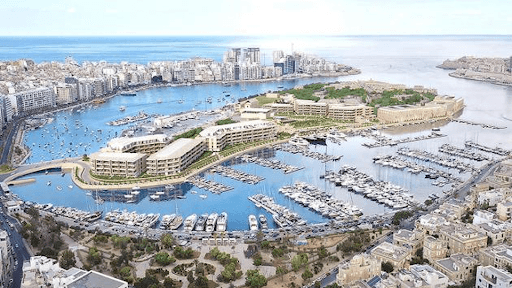Malta
Malta
Institutes In Malta

Study In Malta

Malta is a small and beautiful island nation in the Mediterranean, and it’s quickly becoming a favourite spot for students from all over the world. One big reason is that English is spoken almost everywhere in Malta. This makes it easy for global students to study and get around. The country offers quality education and the degrees are recognised in many other regions of the world. Plus, living and studying in Malta is more affordable than in many other countries. Outside the classroom, students can enjoy sunny beaches, nice weather and a culture that is filled with history and fun festivals. Malta is a safe, welcoming place where students can feel at home. Several of them even find part-time jobs while studying or work opportunities after graduation.
Find out why Malta is becoming a top pick for students everywhere, what you can expect during your studies and how to fully enjoy your life on this sunny island.
Malta – Highlights of Facts and Figures
- Capital: Valletta
- Official Languages: English and Maltese
- Population: ~515,000 (as of 2024)
- Area: 316 km²
- International Students: 600+ (may vary slightly by year and institution)
- Academic Year: September to June
- Currency: Euro (€)
- Country Calling Code: +356
- Time Zone: Central European Time (CET) / GMT+1 (Daylight Saving Time: GMT+2)
Why Choose Malta for Studying Abroad?

Malta stands out as a study destination for several compelling reasons:
- English as an Official Language: English, being one of Malta's two official languages, facilitates social and academic adjustment for international students. Around 90% of Malta’s population speaks English, making it a favourable choice for students seeking higher education.
- Reasonably priced tuition and living expenses: When compared to other European nations, tuition and living expenses are typically lower in Malta. For instance, living expenses (not including rent) average about €785 per month, while undergraduate tuition fees at the University of Malta ranges from €8,000 to €12,000 annually.
- Internationally Acknowledged Education: Malta's educational system adheres to the Bologna Process, guaranteeing that degrees are accepted throughout Europe and beyond. The strong ties that Malta has with major European countries offers students access to a prosperous economy and opportunities to live and work across Europe. Its active participation in the EU’s Erasmus+ programme further elevates educational and exchange prospects.
- Safe and Friendly Environment: Malta is a safe and welcoming place for students because of its low crime rate and friendly residents.
- Rich Culture and History: With more than 7,000 years of history, colourful celebrations and a lively arts scene, Malta offers a unique cultural experience.
- Strategic Location: Malta’s central location in the Mediterranean makes it a gateway for travel across Europe, North Africa and the Middle East.
Malta Higher Education System

The higher education system in Malta is modern, diverse and developing quickly. In 2023, 46.3% of Maltese citizens between the ages of 25 and 34 held a tertiary qualification, which was higher than the EU average of 43.1% and already surpassing the EU's 2030 target of 45%. Malta's commitment to internationalisation and academic excellence is reflected in this growth.
Various Institution Types Include:
- University of Malta: One of the oldest universities in Europe and the top university in Malta, it was founded in 1592 and provides a broad range of undergraduate and graduate programmes.
- Malta College of Arts, Science & Technology (MCAST): It focuses on vocational and technical education. The tuition fees for undergraduate courses at MCAST ranges from €6,500–€10,000 per year.
- Specialised Institutes: Includes the institutions like the Institute of Tourism Studies (ITS) which cater to Malta’s expanding hospitality sector.
- Private and International Universities: Features the American University of Malta and International European University, Malta Campus.
Industry-Aligned Education:
The education system in Malta is designed to meet the rising needs of the present employment market. The institutions like Malta College of Arts, Science & Technology (MCAST) work in tandem with both local and international industries to create skill-based and practical programmes that prepare students for professions that are sought after at the global stage. Courses in high demand sectors such as IT, finance, tourism and healthcare are developed with direct input from industry partners, making sure that students gain both theoretical knowledge and experiential learning.
Educational system in Malta is governed by the Malta Qualifications Framework (MQF), which is based on the European Qualifications Framework (EQF). This alignment ensures that qualifications obtained in Malta are guaranteed to be transparent, comparable and recognised throughout Europe and in other countries as well. From advanced degrees to vocational certificates, the MQF encompasses all educational levels and places a strong emphasis on learning outcomes that meet with the demands of the labour market.
Employers and educational institutions worldwide highly value Malta’s qualifications, thanks to the quality assurance, accreditation and recognition provided by the Malta Further and Higher Education Authority (MFHEA). The MFHEA maintains that both academic and practical learning are held to high standards in line with international guidelines. There is a strong focus on employability and international recognition that makes Malta an appealing destination for students seeking career-ready, globally relevant education.
Internationally Valued Degrees
The higher education system at Malta uses ECTS or the European Credit Transfer and Accumulation System, which is a standard across Europe. This makes sure:
- Easy Credit Transfer: Students can transfer credits between different universities in Europe.
- Global Recognition: Degrees obtained in Malta are respected globally thereby opening doors for further study or employment opportunities worldwide.
- Flexible Learning: Bachelor’s degrees usually require 180–240 ECTS credits (3–4 years), while Master’s degrees need 90–120 ECTS credits (1–2 years).
Premier Universities in Malta for International Education
The universities in Malta follow an academic structure inspired by the British education system, known globally for its quality and comprehensive study pattern. A strong focus is laid on academic excellence, research and employability. Based on factors such as global recognition, international student support and career outcomes, here are some of the notable universities in Malta:
- University of Malta
- Malta College of Arts, Science and Technology (MCAST)
- Idea Academy
- Queen Mary University of London
- Ascencia Business School Malta
- Global Business School
Why Malta Stands Out?
Malta offers a unique mix of traditional education and modern learning:
- English-Taught Programmes: International students don’t face language problems as most courses are in English.
- Multicultural Campus Life: Students from over 80 countries study in Malta, building a diverse and welcoming community.
- Modern Facilities: Universities have highly developed labs, libraries and support services for students.
- Career-Focused Learning: There are several courses that include internships and hands-on training, especially in tourism, tech, business management and healthcare.
- A Paradise for Sports and Adventure Lovers: Malta isn’t just about studying — it’s perfect for students who love the outdoors. You can enjoy exciting activities like hiking, diving, paragliding, mountain biking, snorkeling and more. It’s a great place for a balanced and active lifestyle.
Cultural Highlights of Studying in Malta
Malta is a group of 3 islands—Malta, Gozo and Comino—that are situated in the Southern Mediterranean between Europe and North Africa. It has stunning locations like the Blue Lagoon and the ancient city of Valletta despite its small size. Malta makes studying abroad an amazing experience because of its sunny weather and abundance of things to discover. It’s a place to live, explore and grow:
- Historical Sites: Explore Valletta (a UNESCO World Heritage site), the ancient city of Mdina and prehistoric temples like Hagar Qim and Mnajdra.
- Festivals: Enjoy Malta International Arts Festival, Isle of MTV and traditional village feasts with fireworks, music and food.
- Outdoor Activities: With over 300 days of sunshine a year, students can hike, swim, dive or relax on stunning beaches like Blue Lagoon and Golden Bay.
- Welcoming Locals: Maltese people are known for their friendliness, making it easy to integrate and make friends.
Admission Requirements for Foreign Students in Malta

Admission requirements vary by institution and programme, but generally include:
- Academic Requirements: In order to become eligible for undergraduate programmes, students must have finished secondary school in a level comparable to Malta's A-levels. A relevant bachelor's degree is necessary for postgraduate programmes.
- English Proficiency: IELTS, TOEFL or PTE scores are normally required by universities as evidence of English language proficiency.
- Application Documents: These include academic transcripts, certificates, a current passport, a personal statement and letters of recommendation.
- Foundation Courses: To bridge the gap, students who don't fit the requirements for direct entry can sign up for foundation courses.
General Guidelines for Visa Process for International Students in Malta

Most non-EU students need a student visa to study in Malta. Find the general process for visa application below:
Required Documents:
- Valid passport (at least 3 months beyond your stay)
- Complete visa application form
- Two recent passport photos
- Acceptance letter from a Maltese educational institution
- Proof of financial status like bank statements, wage slips, ITR, etc.
- Health insurance covering at least €30,000
- Proof of accommodation (rental agreement, hostel booking, etc.)
- Visa application fee (€60 for adults)
- Travel itinerary (for stays under 91 days)
- Educational certificates, No Objection Certificate and other supporting documents
Visa Application Steps:
- Check visa requirements and gather documents.
- Fill out and sign the application form.
- Schedule and attend a visa appointment for biometrics.
- Submit your application and supporting documents.
- Track your application status online.
- Collect your visa upon approval.
Residence Permit: Students must apply for a residence permit upon arrival, which they must keep during their stay.
Living in Malta: Cost and Student Experience

Tuition Fees
- Undergraduate Level Programmes:
- University of Malta: €8,000–€12,000/year
- MCAST: €6,500–€10,000/year
- Private Institutions: Vary by course
- Postgraduate Level Programmes:
- University of Malta: €10,000–€15,000/year
- MCAST: €9,000–€12,000/year
- Private Institutions: Vary by course
- Medical Programmes: MBBS can cost €18,000–€22,000/year.
Living Expenses
- Accommodation: €300–€800/month (university dorms, shared flats or private rentals).
- Food: €100–€150/month.
- Transportation: €25–€40/month for public transport.
- Health Insurance: €40–€80/month.
- Miscellaneous: €100–€250/month.
- General Living Expenses (excluding rent): Around €785/month.
Student Life
- Safe and Calm: Malta is a stress-free country because of its low crime rate and Mediterranean way of life.
- Student Support: Counselling, career guidance and accommodation assistance are all provided by universities.
- Social Opportunities: Get to know people from all over the world by joining clubs, societies and events.
Moving Around the City
Malta is a small island that is very convenient to get around:
- Public Transportation: Towns, cities and campuses are connected by a vast bus network. Student passes are reasonably priced per month.
- Bicycling: Common mode in university towns and many places are pedestrian-friendly.
- Ferries: Malta is connected to Gozo and Comino by regular ferries, which are ideal for weekend excursions.
Internships & Part-Time Work in Malta for International Students
- Part-Time Work: International students can work up to 20 hours per week during the academic year, mainly in hospitality, tourism and retail.
- Internships: There are several programmes that include internships or practical placements, especially in tourism, technology, business management, tech and healthcare, providing valuable work experience.
Banking: For managing finances efficiently, it is recommended to open a local bank account.
Career Perspectives for Students

Malta enjoys one of the lowest unemployment levels in Europe, supported by a dynamic and steadily growing economy. Leading industries include:
| Industry | Career Prospects for Graduates |
| Technology & Innovation | IT, Software Development, Fintech |
| Tourism & Hospitality | Hotels, Travel Agencies, Event Management |
| Gaming | Online Gaming, Software Development, Customer Support |
| Education | Teaching, Research, Administration |
| Healthcare & Pharmaceuticals | Hospitals, Clinics, Medical Research |
- Post-Study Employment: Malta's growing industries, particularly technology, gaming, tourism and healthcare, offer employment opportunities for graduates with the necessary skills.
- EU Recognition: Maltese degrees are accepted throughout the EU, enabling graduates to look for employment or pursue additional education in other European nations.
- Entrepreneurship: Startups and innovation are encouraged in Malta's business-friendly environment, particularly in the digital sector.
Scholarships and Financial Aids in Malta
Malta provides international students with a number of financial aid options. Postgraduate students, including those from outside the EU, are supported by the Malta Government Scholarships Scheme (MGSS). Maltese and EU students pursuing master's and doctoral degrees are the target audience for the Tertiary Education Scholarships Scheme, or TESS. Merit-based and need-based scholarships, including the UM Think Scholarships for research and innovation, are available from the University of Malta. Erasmus+ funds, which cover mobility grants and exchange programmes, are also available to international students enrolled in European universities. Based on academic achievement, a few private universities, such as MCAST and Global College Malta, provide internal scholarships or tuition fee waivers.
Conclusion
To sum up, Malta offers more than just a beautiful scenic backdrop; with its pristine waters, sun-drenched coastlines and rich cultural heritage, it offers a truly inspiring environment for education and personal growth. This island nation, which serves as a bridge between Europe and North Africa, combines a friendly, English-speaking community with global perspectives. Malta is an outstanding option for higher education because of its top-notch educational system, programmes that are in line with industry standards and growing international reputation. Malta provides the ideal setting to mould your future under the Mediterranean sun, regardless of your motivations—academic aspirations or a desire to experience life outside of the classroom.
Blogs In Malta

- Apr 4, 2025
- Management

- May 30, 2025
- Hospitality

- Jun 5, 2025
- Technology

- Jun 6, 2025
- Management

- Jun 10, 2025
- Hospitality

- Jul 9, 2025
- Technology

- Jul 10, 2025
- Hospitality

- Jul 10, 2025
- Hospitality

- Jul 11, 2025
- Hospitality

- Jan 21, 2026
- Management

- Aug 5, 2025
- Management

- Aug 21, 2025
- Technology

- Aug 22, 2025
- Management

- Aug 22, 2025
- Technology

- Aug 25, 2025
- Technology

- Aug 29, 2025
- Management

- Aug 30, 2025
- Management

- Oct 22, 2025
- Technology

- Jan 1, 2026
- Technology

- Dec 29, 2025
- Management

- Feb 16, 2026
- Management

- Oct 6, 2025
- Technology

- Sep 24, 2025
- Management

- Sep 26, 2025
- Management

- Oct 8, 2025
- Management

- Oct 13, 2025
- Management

- Oct 22, 2025
- Technology

- Oct 27, 2025
- Hospitality

- Dec 11, 2025
- Technology

- Nov 7, 2025
- Management

- Nov 6, 2025
- Technology

- Nov 20, 2025
- Hospitality

- Dec 30, 2025
- Technology

- Jan 6, 2026
- Arts and Humanities

- Jan 14, 2026
- Hospitality

- Jan 27, 2026
- Technology


